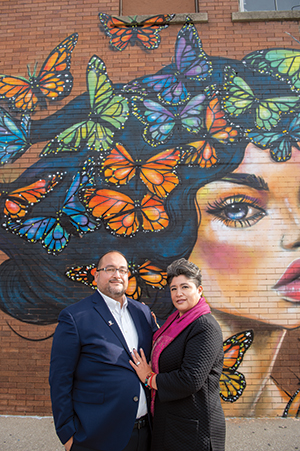Writer: Rachel Vogel Quinn
Photographer: Duane Tinkey

The day that Tar and Erika Macias moved to Des Moines in 2018, someone sprayed “Deport illegals” on Bloomfield Road on the south side, near their new home. Immigrants from Mexico, they wondered whether they had done the right thing in coming here. But, Tar concluded, “Maybe that’s the reason we need to be here—to create goodwill and to dissipate the misinformation out there about the immigrant community.”
Together, the couple runs Hola America, an organization that serves and raises awareness about Latino Americans in the Midwest through two newspapers, consulting, public relations, social media and events, including a Quinceanera fashion show and a holiday posada. Tar and Erika are the only employees, though they collaborate with others on various projects.
Tar, 46, began Hola America in the Quad Cities in 2000 when the local Spanish-language newspaper where he was working folded. As a businessman, he was interested more in ad sales than journalism or community engagement.
That changed in 2008. First the recession hit. Then he began dating Erika, now 45, who quickly lent her skills to the organization. They decided to expand their audience to second-, third- and fourth-generation Latino Americans, as well as to anyone in the community who cared about diversity and inclusion—two reasons they publish their newspapers in both Spanish and English.
What’s more, the couple created a strategic plan that turned Hola America into what they call a “community service,” connecting their audience with businesses, nonprofits, and government agencies that want a meaningful relationship with Latino Americans. Clients have included Iowa State University Extension and Outreach, Des Moines Community Playhouse and Des Moines Metro Credit Union.
In 2014, the couple spun off a second organization, Hola Iowa. Although the business model is the same as Hola America, Hola Iowa focuses only on the state. One reason the Maciases moved to Des Moines was that they believed an organization based in the capital city could have a bigger impact.
In Des Moines, Hispanics and Latinos make up nearly 14% of the population. Some 20% of them live in poverty, compared with 10% of whites. Serving Latinos struggling with poverty, education and language drives Tar and Erika.
That commitment arose from experience. When Erika first came to the U.S., she didn’t speak English, and sometimes struggled to afford food for her son and two daughters. At the time, she says, she told herself that “I’m going to do something someday. I am going to help people.”
Tar refers to his wife as the guiding light of Hola America. Erika has a different title for herself: “I’m the boss,” she says with a laugh. “I take care of everything.”
Joe Gonzalez, a retired Des Moines police officer and organizer of the Latino Heritage Festival in Des Moines, has worked with the Maciases for years. “Their passion and energy is a great example of how we should all be involved to make our community a better place,” he says.
From their perspective, Tar says, “We see a big disconnection here in Des Moines between the Latino community and the mainstream community.”
He and Erika hope to change that by combating stereotypes. “I tell people: ‘Don’t listen to the news. Experience it yourself,’ ” Tar says. “Invite somebody to lunch. Talk to somebody in line at the supermarket.”
Our ignorance of one another is holding Des Moines back, Tar believes. He cites “best city” lists where Des Moines ranks near or at the top. “It’s great that we’re No. 1, but guess what? That’s not working out for all of us,” he says. “Some of us aren’t getting the benefits of that.”
The Maciases’ long-term goal, Tar says, is “for our [Latino] community to know the Iowa culture and for Iowa to be appreciative of Latino culture. It’s a two-way street. If, at the end of the day, people say that the immigrant community is making the whole community better, then we did our job.”







